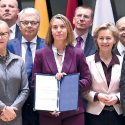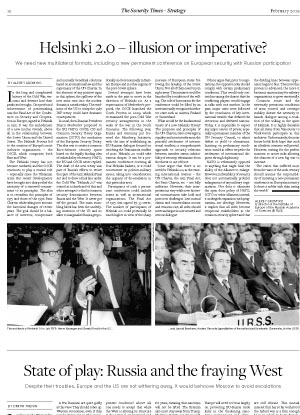Helsinki 2.0: We need new multilateral formats, including a new permanent conference on European security with Russian participation
In the long and complicated history of the Cold War, tensions and détente had their peaks and troughs. One profound achievement of peacemaking was the Final Act of the Conference on Security and Cooperation in Europe, signed in Helsinki in 1975. It was the embodiment of a new modus vivendi, above all in the relationship between the Soviet Union and the United States. The Helsinki Process led to the creation of Europe’s most inclusive organization – the OSCE, which comprises both East and West.
The Helsinki treaty has not become outdated, and the OSCE continues to play a crucial role – especially since the Ukrainian crisis. But recent developments have brought into sharp relief the necessity of a renewed commitment to its principles. The idea is to reconfirm the principles of 1975 and those of the 1990 Paris Charter, while taking into account the historical changes of recent years. The goal should be a balance of interests, compromise and mutually beneficial solutions based on international law and the supremacy of the UN Charter. In the absence of any positive signs in this sphere, the spillover of the new arms race into the nuclear domain is a stark reality. The readiness of the US to scrap the 1987 INF treaty could have dramatic consequences.
In 2008, then-Russian President Dmitri Medvedev proposed to the EU, NATO, OSCE, CIS and Common Security Treaty Organization (SCTO) the conclusion of the European Security Treaty. The idea was to create a common Euro-Atlantic security space based on the legally binding idea of indivisibility of security. NATO, the EU and OSCE never replied. The draft of the new treaty was part of Russia’s efforts to revive the spirit of the 1975 Helsinki Final Act and to draw a final line under the Cold War. “Helsinki 2.0” was coined as a shorthand of this and other attempts to find a common security denominator between Russia and the West. It never got off the ground. The main stumbling block has been the underlying intention of the US and its allies to marginalize Russia geopolitically and economically in Eastern Europe and in other regions of the post-Soviet sphere.
Several attempts have been made in the past to move in the direction of Helsinki 2.0. As a repercussion of Medvedev’s proposal, the OSCE launched the Corfu Process in 2009, which re-examined the post-Cold War security arrangements in the wake of the war in the South Caucasus. The following year, Russia and Germany put forward the Meseberg Initiative, with the aim of establishing an EU-Russian dialogue focused on resolving the Transnistria conflict of 2010. Helsinki 2.0 could take various shapes. It can be a permanent conference covering all four Helsinki baskets, or it could concentrate on politico-military issues, taking into consideration the urgency of de-escalation in this particular area.
Participants of such a permanent conference could include states as well as international organizations. The Final Act of 1975 was signed by 35 states. The number of participants of Helsinki 2.0 could potentially be much higher in view of the sharp increase of European states following the breakup of the Soviet Union. Not all of them need to join right away. The initiative could be launched by a coalition of the willing. The role of host nation for the conference could be filled by an internationally recognized mediator state such as Austria, Finland or Switzerland.
What would be the fundamental tenets of a new Helsinki Treaty? The purposes and principles of the UN Charter; state sovereignty; equality and non-interference; the peaceful settlement of international conflicts; a comprehensive approach to security relations between member states; indivisibility of security; refrainment from the threat or use of force.
Some argue that there is no need for Helsinki 2.0, as the existing international treaties – the UN Charter, the 1975 Final Act, the Paris Charter, etc. – are fully sufficient. However, their interpretations vary while new historical circumstances take hold and pose new challenges. Lest mutual claims and counterclaims mount and tensions rise, all sides should meet and argue in a structured and serious dialogue. Others argue that, prior to negotiations, the opposite sides should comply with certain preliminary conditions. This would only succeed in ruining the chance that the conflicting players would engage in talks with one another. In the past, major wars were followed by the conclusion of key international treaties that defined the victorious and defeated nations. Today, it is impossible to expect any major center of power, especially a permanent member of the UN Security Council, to admit defeat or yield to ultimatums. Insisting on preliminary conditions would in effect torpedo the settlement of international disputes through diplomacy.
NATO is vehemently opposed to anything that might limit the ability of the Alliance to enlarge. However, indivisibility of security does not automatically prohibit enlargement of any military organization. Nor does it eliminate the open door policy of NATO, SCTO or other alliances; instead, it undergirds expansion with pragmatism, not ideology. Moreover, it implies that all sides become reciprocal stakeholders in the common security sphere and that the dividing lines between opponents begin to blur. The more this process is advanced, the more it becomes unnecessary for military organizations to grow territorially.
Common sense and the extremely precarious conditions of arms control and strategic stability dictate the necessity to launch dialogue among a coalition of the willing in the spirit of Helsinki. It is highly desirable that all states from Vancouver to Vladivostok participate in this endeavor. Unfortunately, the near future holds little hope that such an idealistic scenario will prevail. However, waiting for the perfect moment to arrive risks allowing the chances of a new big war to increase.
The states that suffered most from the wars of the 20th century should assume the responsibility of initiating a new permanent conference on European security. Is there a nobler task than saving the world?
ALEXEY GROMYKO
is director of the Institute of Europe of the Russian Academy of Sciences (IE RAS).




